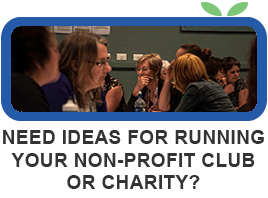Last updated October 12, 2018
Innovation comes in all shapes and sizes. Whether you need more money, more volunteers, a new way to do X or a better way to do Y, creative thinking skills, problem solving and innovation are vital skills for a successful and sustainable organisation.
Here are four keys for supporting and encouraging innovation in your organisation.
The Journey Starts With You
Encouraging innovation starts with you. As a leader, or manager, you set the tone for your organisation or team. You create the climate and make it possible for people to feel safe sharing their ideas without fear of failure.
Be a visibly committed leader. Constantly talk about the importance of innovation for your organisation. Lead by example. Model the behaviors you want to see in others. If you don’t think creatively with your own work or constantly challenge yourself to improve the way you do things, then you can’t expect that from your team.
Let your team see you generating and developing ideas, encourage them to do the same and be involved. Make yourself available to hear ideas. Start with something small that will make a difference and be involved in seeing it through to implementation. Celebrate success when it happens. What you do is much more powerful than what you say.
Create a Culture
Organisational culture can be the single greatest determinant of innovation success. Some ideas for creating an innovation culture include:
- Designing guiding principles. Create and agree the ways you will work together when generating and developing ideas. Pointing to previously agreed principles can be a great way to help keep people on track.
- Using a shared language such as phrases that indicate whether you are generating ideas (‘I wish we could….’) or developing ideas (‘What you do is…..) can become a great way of sign-posting what people are looking for.
- Harnessing the power of language. Do you hear ‘Yes but….’ often? Replacing the ‘but’ with an ‘and’ helps create a climate that lets ideas be heard.
- Encourage people to hear new ideas, suggestions and try new things with an open mind. Actively look for what works and then raise concerns as tasks for problem solving eg. How can we find the resources to do this vs. We don’t have the resources to do this.
- Encourage curiosity and exploration eg. ‘what if we could….’, ‘imagine if we could…’
- Actively collaborate. Encourage your team to share information about what they are doing and actively ask for ideas from others.
- Encourage ideas from anywhere and everywhere. Look for the big and small ideas that will make a difference. Get information and communication flowing – up and down, side to side and from outside.
Give People Tools
Invest in training your team in tools and processes that enable innovation. Train your team in creativity techniques and processes for generating, building and developing ideas. Use constructive processes for sharing ideas with others in different parts of your organisation (these can be great for using with your Board too).
Have simple, clearly defined criteria for selecting the ideas that improve day-to-day operations and will help your organisation achieve your vision. By creating a simple process for getting ideas through to implementation, people can focus on being creative rather than how to get ideas approved.
Make Time to Innovate
When I talk with teams about barriers to innovation, time is a biggie. However, it can be a chicken and egg situation. Freeing up time to review and improve what we do and how we do it can make organisations more efficient, therefore freeing up more time. Leading by example, working on culture, getting people excited and arming them with the tools for the job will all help you find time.
The world’s most innovative organisations set aside time for innovation. 3M have the ‘15% rule’, where employees are able to spend 15% of their time exploring ideas they are passionate about. This 15% rule is credited for the invention of the Post-it Note. Google have ‘20% time’ where people are encouraged to spend 20% of their time working on what they think will most benefit Google. The message about the importance of innovation and permission to prioritise is clear.
Megan Thorn
Megan is a Facilitator / Trainer with Exult and manages the Auckland / Waikato region.
If you think this article would be useful for your members, you are welcome to use it on your website or in your newsletter. We just ask that you let us know where it is being used, and that you acknowledge our website at the bottom of the article. If you are using the article online, please include a link to our homepage.




